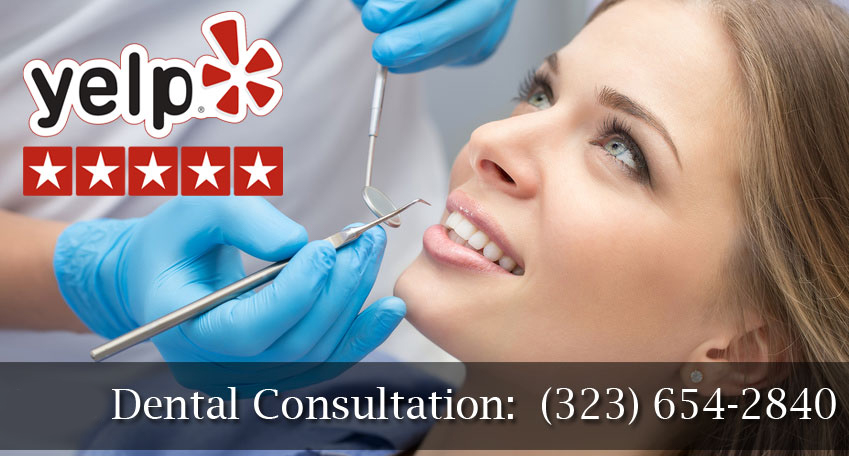What options do I have for the strongest denture adhesives? The correct answer to that question depends on your situation. Sometimes, it can be pretty uncomfortable to chew food with dentures, especially when acidic food slips into the soft gum tissues. In this situation, denture adhesives will add stability to the dentures to make chewing less painful. Adhesive formulas also have a protective seal to prevent food particles from entering the gap. Besides comfort, you can also add denture adhesives to fight breath. Most options come with antibacterial properties that keep the mouth fresh for as long as six hours.
However, these adhesives are not for everyone. You can still have a good experience with dentures without using adhesives, especially if you go for high-quality dental services. Experienced dentists at West Hollywood Holistic and Cosmetic Dental Care understand that well-fitted dentures will stay in place for up to 10 years, even without adhesives. We only recommend the best dentures adhesives if your mouth bone structure experiences shrinkage. In that case, the jaw bone cannot hold the dentures properly. Sometimes, you may also need to add adhesives a few years into using dentures.
What are Denture Adhesives?
Denture adhesives are dental products with adhesive properties that add retention to the dentures to enhance stability, chewing ability, and comfort. Your dentist can apply the adhesive either on or underneath the dentures. The best dentures adhesives come in powders, pastes, or even adhesive pads. However, adhesive dentures are ideal if you only use them in small amounts. If you have to use an incredibly high amount, then you either need new dentures, or the current ones require a denture reline.
However, also note that denture adhesives only offer a temporary solution. A high-quality adhesive formula won’t strengthen the shrinking jaw bone. It only provides more stable support to loose dentures. So in the long haul, you might need to visit your dentist for denture replacement.
The Best Dentures Adhesives in 2021 and Beyond
There are several options for denture adhesives built for unique circumstances. For instance, if you’re uncomfortable due to food particles slipping underneath your dentures, you can go for a high-quality denture adhesive cream. Creams provide a superior food seal, preventing irritation, pain, and discomfort when chewing. Moreover, any denture adhesive cream is easy to use, especially for amateurs. Apply a thin layer around the denture’s edges to create a temporary seal, and you’re good to go.
Some of the strongest denture adhesives based on individual preferences and needs include:
• Zinc-Free Denture Adhesives
Up to today, many people still fear using adhesives for upper and lower dentures because of possible zinc contamination. Initially, manufacturers used zinc as part of the adhesive ingredients. Consequently, manufactures faced many lawsuits as patients could link various health complications such as permanent never damage to using zinc-based adhesives. However, the truth is that zinc is safe when applied correctly in the recommended quantities. Thus, there is a high likelihood that the affected customers relied on massive amounts instead of what the manufacturer recommended.
Even so, you no longer need to worry about zinc contamination. You can now enjoy a wide range of safe zinc-free adhesive formulas even if you over-apply the product. The best zinc-free adhesive formula for dentures is Super Poligrip-Free Cream. This product guarantees a secure, long-lasting hold that will keep you going throughout the day. In addition, it is ideal for keeping food particles out of the soft gum tissues. The best part? This adhesive formula is free from any artificial additives such as flavors and dyes.
• Adhesives for Lower Dentures
Expert dentists recommend using the strongest denture adhesives that can secure the lower dentures without oozing. So which adhesive formulas should you go for to hold your lower dentures? Fixodent Complete Original Denture Cream makes one of the most reliable denture adhesives for lower dentures. Besides the reasonably affordable price tag, this product comes with a narrow applicator for precise dispensing. This feature saves you from over-applying denture adhesives. Also, this product is zinc-free and provides superior, long-lasting holding.
• Adhesives for Upper Dentures
Well-fitting upper dentures use a suction technic to stay in place and remain stable. However, over time, the dentures can feel loose, creating a space that allows air and liquid to penetrate underneath. Thus, you can feel uncomfortable or even pain when food particles penetrate the gap. One of the prolific denture adhesives that can help stop all these woes is Ezo Denture Cushions. This product has embedded adhesive properties that help form another seal around the upper dentures. However, you may need to customize the cushions with scissors to fit correctly.
• Powder-Based Denture Adhesives
Powder-based denture adhesives offer the same glue properties as cream. However, if you often laugh, sneeze, or cough. Moreover, they are easy to apply; hence ideal for beginners. You can go for Fixodent Extra Hold if you want a high-quality powder adhesive formula. Why Fixodent Extra Hold? This product offers the strongest hold among all powder adhesive formulas in the market. It provides an excellent, secure seal that prevents food particles from getting beneath the denture. Moreover, this product is versatile, and you’ll find it helpful for both full and partial dentures.
• Adhesives for Soft Liners
What are the best denture adhesives for soft liners? The honest answer is none. Why? Soft liners have a unique design that makes the dentures adapt to your jaw and gum structure. That is why dentists recommend soft liners to patients with deteriorated or very sore gums. However, if you use an adhesive on a soft liner, it will be difficult to remove it without damaging the liner. Moreover, you may end up experiencing severe gum sores. If you often find it hard to go without denture adhesives on a denture fitted with soft liners, you would want to visit your dentist for relining.
If you cannot do an immediate denture reline, you can use an adhesive formula with soft liner properties. In that case, cushion-grip denture adhesives sound like the best plan.
• Natural Denture Adhesives
Some patients prefer completely natural adhesive formulas because of aesthetic preference or even allergic conditions. Remember, even zinc-free denture adhesives can contain several toxic ingredients such as petrochemicals, scents, artificial flavors, or even preservatives. So, what options do you have for natural denture adhesives? You can go for BioForce or NaturDent. These formulas are among the best-selling market products and use organic ingredients such as natural gums, glycerin, and pine resin. However, kindly note that all-natural adhesives attract a premium price tag.
• Adhesives for Partial Dentures
Partial dentures feature a unique design because they support already existing natural teeth. Thus, you don’t need to use an adhesive formula at all with properly-fitted partial dentures. However, depending on habits and the foods you consume during the day, partial dentures can sometimes feel loose. You don’t want to experience that uncomfortable feeling in the middle of a social setting. In that case, you can use temporary, powder-based denture adhesives such as Fixodent Extra Hold. This product stacks up relatively well to alternative market adhesive formulas for partial dentures.
• Cushion-Grip Denture Adhesives
Lastly, you can choose cushion-grip denture adhesives if you want a relatively permanent option that lasts up to four days. These products feature a thermoplastic adhesive formula with soft liner properties. However, this adhesive product will only last for the intended period if you use it properly and clean your dentures daily. They are a go-to option if your dentures are extremely loose and often rub the gum’s soft tissues, leaving some sores. Cushion-grip adhesives fill the excess space beneath the dentures to enhance stability and provide a secure seal.
However, just like other adhesive formulas, cushion-grip products just offer a temporary solution, and you cannot substitute them for well-fitting dentures. If you find it hard using them, you can ask your dentist to recommend the best dentures adhesives for secure sealing.
How to Apply Denture Adhesive
As noted, denture adhesives come in creams, powders, or even pads/ strips. The strongest denture among the three depends on your needs. For instance, public speakers and musicians may find a high-quality denture adhesive cream to offer more stability than powders or pads. So, how do you apply these adhesives to your dentures? First, it will help if your dentures are clean before application. Expert dentists recommend soaking and brushing your dentures at least daily. Also, you can use a non-abrasive denture to wipe food particles.
How to Apply Powder-Based Denture Adhesives
Follow this procedure:
• Clean your dentures using a non-abrasive cleanser. You can also use a bristle brush.
• Prepare a glass of warm water and use it to wet down the dentures.
• Hold your powder adhesive and sprinkle it underneath the denture. After covering the whole underside, shake the denture to remove the loose powder.
• Install your dentures and wait for a few seconds to let the powder set up and form a strong seal.
How to Apply Cream Denture Adhesives
Follow this procedure:
• Use a non-abrasive cleanser or a bristle brush to clean your dentures before drying them properly. Adhesive creams require dry surfaces; otherwise, they’ll lose the adhesive properties.
• Take a q-tip and spread a small portion of the cream on it (just like you would do with toothpaste on a brush). Then, use the q-tip to apply a small layer of the cream to your dentures.
• Spread the cream around the edges of the dentures to form a seal. Kindly avoid applying the cream in the middle because it can squish out when installing the dentures.
• Return the denture in its place and press down. The adhesive properties in cream products should activate immediately.
How to Use Adhesive Pads
Follow this procedure:
• Just like in the above process, it helps out if you start with clean dentures. Then, use a bristle brush or non-abrasive cleanser to get the job done.
• After cleaning the dentures, dry your hands properly with a clean towel before handling the adhesive pads.
• Strip the packaging to get the pad and lay it in the middle of the dentures.
• Rinse your mouth with warm water before installing the dentures. Then, firmly press the dentures to ensure they fit correctly.
How to Remove Denture Adhesivesm
It is critical to note that you’ll need to clean adhesives off your dentures every night. Also, you must remove the adhesives and clean your mouth (including dentures) before applying more. Otherwise, the adhesive won’t hold properly. Before removing the dentures, rinse your mouth with warm water or a mouthwash. This will help loosen the glue. After that, brush your mouth as you usually do and clean the dentures.
Do I Really Need Denture Adhesives?
As noted, you only need to buy denture adhesives if you only need them. Otherwise, these adhesives are just a temporary solution for denture comfort and stability in social situations. Thus, adhesives are not an alternative for well-fitting dentures. Remember, a well-fitted denture can enhance an enjoyable lifestyle without a possible reliance on adhesives. West Hollywood Holistic and Cosmetic Dental Care is your one-stop provider for denture services. Whatever question you may have about dentures and other dental conditions, we have all the answers under one roof.





